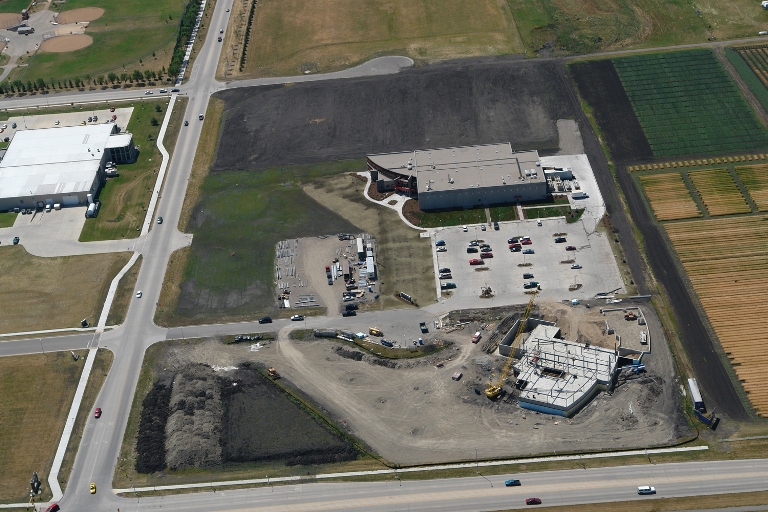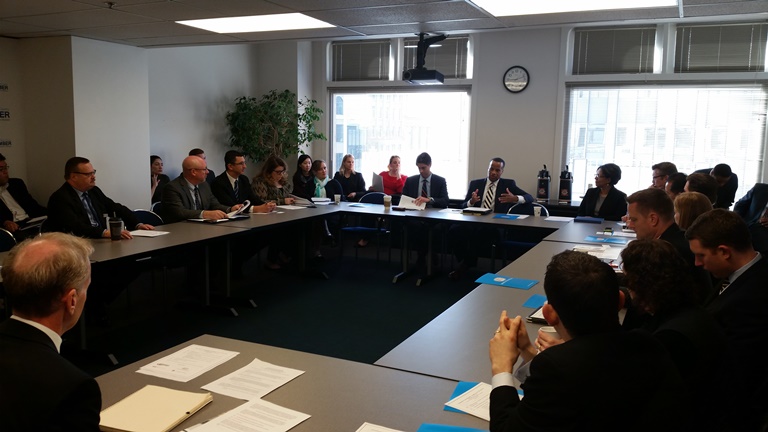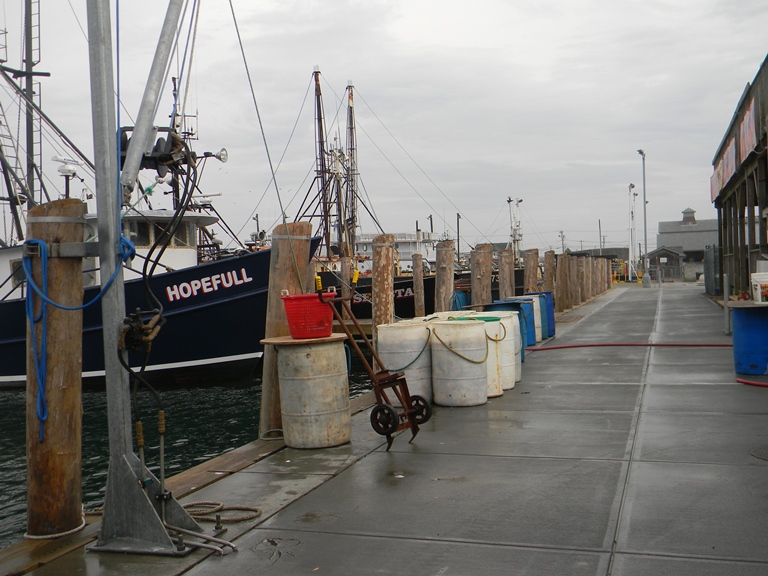Commerce Blog
May 22, 2015
 The world is changing at an ever-increasing rate. Companies and organizations that don’t innovate today may not be around tomorrow. The Obama Administration recognizes the vital importance of supporting innovation, and the Department of Commerce’s Economic Development Administration has been at the forefront of those efforts through its Office of Innovation and Entrepreneurship.
The world is changing at an ever-increasing rate. Companies and organizations that don’t innovate today may not be around tomorrow. The Obama Administration recognizes the vital importance of supporting innovation, and the Department of Commerce’s Economic Development Administration has been at the forefront of those efforts through its Office of Innovation and Entrepreneurship.
Today, Assistant Secretary Jay Williams visited the Rutgers campus to announce that the University is among the recipients of the Science and Research Parks Development Grants, the last grants being issued under the 2014 Regional Innovation Strategies (RIS) Program. Secretary Pritzker announced the recipients of the other two funding opportunities, the i6 Challenge grants and Cluster Grants for Seed Capital Funds, in March.
> Read more
May 12, 2015
 A dramatic transformation in our energy economy is driving fundamental changes in the way we power our homes, offices, factories and communities. This means cleaner air, healthier communities, and new jobs and industries that didn’t exist two decades ago. But it’s also having a profound impact on workers, families and communities who have relied on the coal industry as a source of good jobs and economic security. There are many reasons for this transformation in energy – and there has been vigorous, impassioned debate about those reasons. But debates don’t put food on the table. Solutions do.
A dramatic transformation in our energy economy is driving fundamental changes in the way we power our homes, offices, factories and communities. This means cleaner air, healthier communities, and new jobs and industries that didn’t exist two decades ago. But it’s also having a profound impact on workers, families and communities who have relied on the coal industry as a source of good jobs and economic security. There are many reasons for this transformation in energy – and there has been vigorous, impassioned debate about those reasons. But debates don’t put food on the table. Solutions do.
So, how can government - at all levels – partner with the private sector and civil society to help communities diversify their economies?
In Eastern Kentucky, a bipartisan collaboration between Governor Steve Beshear and Congressman Hal Rogers called Shaping Our Appalachian Region or SOAR is showing one path forward. Wary of yet another task force or commission, the pair instead brought the entire community together to “reassess its current challenges, and discuss ideas or innovations already underway which could be leveraged or aligned to capture emergent regional development opportunities.”
> Read more
NACo Blog
By Kathy Nothstine, NACo Program Director
May 1, 2015
 Last week, a group of county and regional leaders convened in Pike County, Ky., bound by a common interest in finding new ways to grow their economies. Based in communities that have long been reliant on the coal industry, these leaders came together to share ideas and learn about innovative strategies to create jobs and improve quality of life through changing economic times.
Last week, a group of county and regional leaders convened in Pike County, Ky., bound by a common interest in finding new ways to grow their economies. Based in communities that have long been reliant on the coal industry, these leaders came together to share ideas and learn about innovative strategies to create jobs and improve quality of life through changing economic times.
NACo hosted this workshop in Pikeville from April 22 – 24 in partnership with the U.S. Economic Development Administration (EDA) and the National Association of Development Organizations (NADO) Research Foundation, as part of a larger effort to support communities seeking to diversify their economies and create jobs. Known as the Innovation Challenge for Coal-Reliant Communities, this effort is centered on three workshops, the first of which was the Pikeville event.
> Read more
HUD Blog
May 1, 2015
 As our economy recovers from the impact of the Great Recession, we have to remember that it wasn’t just individuals who were deeply affected; municipalities and local governments also suffered devastating consequences. Local governments saw a dramatic reduction in their tax base, forcing them to reduce services and think of creative ways to operate while providing services to their residents.
As our economy recovers from the impact of the Great Recession, we have to remember that it wasn’t just individuals who were deeply affected; municipalities and local governments also suffered devastating consequences. Local governments saw a dramatic reduction in their tax base, forcing them to reduce services and think of creative ways to operate while providing services to their residents.
Today, we can gladly say that the national unemployment rate is 5.5 percent, we have reduced the deficit from 9.8 percent of our economy in 2009, to below 3 percent in 2014, and the private sector has added 12.1 million jobs over 61 straight months of job growth—a new record.
> Read more
May 2015 Newsletter
 America’s roads, bridges, sewers, water lines, and ports are crucial to its economy. They transport people to and from work. They transport goods across cities and states and facilitate domestic and international trade. Everyone can agree that infrastructure is necessary and important, yet America’s is in dire need of upgrading. May 11-16 marks National Infrastructure Week. Now in its 3rd year, Infrastructure Week brings together thousands of stakeholders in Washington and around the country to highlight the critical importance of investing in and modernizing America’s infrastructure systems, and the essential role infrastructure plays in our economy.
America’s roads, bridges, sewers, water lines, and ports are crucial to its economy. They transport people to and from work. They transport goods across cities and states and facilitate domestic and international trade. Everyone can agree that infrastructure is necessary and important, yet America’s is in dire need of upgrading. May 11-16 marks National Infrastructure Week. Now in its 3rd year, Infrastructure Week brings together thousands of stakeholders in Washington and around the country to highlight the critical importance of investing in and modernizing America’s infrastructure systems, and the essential role infrastructure plays in our economy.
EDA has understood the role of infrastructure in economic development for 50 years. In fact, the agency was conceived as part of the Public Works and Economic Development Act in 1965, which demonstrates that the two concepts have been linked for decades. Infrastructure improvements through our public works program have been central to our work from the start. Lately, the condition and importance of infrastructure is gaining wider attention.
> Read more
May 2015 Newsletter
 Trade is so vital to any economy, yet the idea of opening it more widely is met with trepidation and fear. There are many misconceptions about what trade promotion means for jobs in the United States, and that is precisely why Assistant Secretary Williams traveled to Oregon and Washington last month with the U.S. Chamber of Commerce to help set the record straight.
Trade is so vital to any economy, yet the idea of opening it more widely is met with trepidation and fear. There are many misconceptions about what trade promotion means for jobs in the United States, and that is precisely why Assistant Secretary Williams traveled to Oregon and Washington last month with the U.S. Chamber of Commerce to help set the record straight.
The Trade Promotion Authority – or TPA – is a framework that will enable the United States to enter into trade negotiations and ultimately create agreements with other nations. Letting the last TPA - which was passed in 2002 - expire in 2007, has significantly curtailed the United States’ ability to be at the table when trade agreements are reached. The fact of the matter is that the global economy is moving forward, and trade negotiations will happen with or without the United States’ participation. It’s important that we take our seat at the table and help shape the policy and agreements that will have enormous impact on our position in the global economy.
> Read more
May 2015 Newsletter
 What if there were no roads leading to Disneyland? Everything about the park would be exactly the same – the rides, the characters, the souvenirs, the churros – but there would be no easy and reliable way to get to the “happiest place on earth.” While it’s true that the park is the attraction, the road that gets you there is critical. Infrastructure isn’t exciting or sexy, but it is necessary. It plays a vital role in supporting commerce, but it gets none of the glory. In fact, it only gets attention when it fails.
What if there were no roads leading to Disneyland? Everything about the park would be exactly the same – the rides, the characters, the souvenirs, the churros – but there would be no easy and reliable way to get to the “happiest place on earth.” While it’s true that the park is the attraction, the road that gets you there is critical. Infrastructure isn’t exciting or sexy, but it is necessary. It plays a vital role in supporting commerce, but it gets none of the glory. In fact, it only gets attention when it fails.
Since it was established as a commercial fishing port by the state of Rhode Island in the 1940’s, the Port of Galilee in Narragansett has grown to become one of the largest working commercial fishing ports on the East Coast, providing fish and lobster to both national and international markets. It includes 38 docks and piers and is home to over 240 commercial fishing vessels. The Port supports hundreds of small to medium-size businesses that attract hundreds of employees and thousands of tourists each year.
> Read more
 The world is changing at an ever-increasing rate. Companies and organizations that don’t innovate today may not be around tomorrow. The Obama Administration recognizes the vital importance of supporting innovation, and the Department of Commerce’s Economic Development Administration has been at the forefront of those efforts through its Office of Innovation and Entrepreneurship.
The world is changing at an ever-increasing rate. Companies and organizations that don’t innovate today may not be around tomorrow. The Obama Administration recognizes the vital importance of supporting innovation, and the Department of Commerce’s Economic Development Administration has been at the forefront of those efforts through its Office of Innovation and Entrepreneurship.


 A dramatic transformation in our energy economy is driving fundamental changes in the way we power our homes, offices, factories and communities. This means cleaner air, healthier communities, and new jobs and industries that didn’t exist two decades ago. But it’s also having a profound impact on workers, families and communities who have relied on the coal industry as a source of good jobs and economic security. There are many reasons for this transformation in energy – and there has been vigorous, impassioned debate about those reasons. But debates don’t put food on the table. Solutions do.
A dramatic transformation in our energy economy is driving fundamental changes in the way we power our homes, offices, factories and communities. This means cleaner air, healthier communities, and new jobs and industries that didn’t exist two decades ago. But it’s also having a profound impact on workers, families and communities who have relied on the coal industry as a source of good jobs and economic security. There are many reasons for this transformation in energy – and there has been vigorous, impassioned debate about those reasons. But debates don’t put food on the table. Solutions do. Last week, a group of county and regional leaders convened in Pike County, Ky., bound by a common interest in finding new ways to grow their economies. Based in communities that have long been reliant on the coal industry, these leaders came together to share ideas and learn about innovative strategies to create jobs and improve quality of life through changing economic times.
Last week, a group of county and regional leaders convened in Pike County, Ky., bound by a common interest in finding new ways to grow their economies. Based in communities that have long been reliant on the coal industry, these leaders came together to share ideas and learn about innovative strategies to create jobs and improve quality of life through changing economic times. As our economy recovers from the impact of the Great Recession, we have to remember that it wasn’t just individuals who were deeply affected; municipalities and local governments also suffered devastating consequences. Local governments saw a dramatic reduction in their tax base, forcing them to reduce services and think of creative ways to operate while providing services to their residents.
As our economy recovers from the impact of the Great Recession, we have to remember that it wasn’t just individuals who were deeply affected; municipalities and local governments also suffered devastating consequences. Local governments saw a dramatic reduction in their tax base, forcing them to reduce services and think of creative ways to operate while providing services to their residents. America’s roads, bridges, sewers, water lines, and ports are crucial to its economy. They transport people to and from work. They transport goods across cities and states and facilitate domestic and international trade. Everyone can agree that infrastructure is necessary and important, yet America’s is in dire need of upgrading. May 11-16 marks
America’s roads, bridges, sewers, water lines, and ports are crucial to its economy. They transport people to and from work. They transport goods across cities and states and facilitate domestic and international trade. Everyone can agree that infrastructure is necessary and important, yet America’s is in dire need of upgrading. May 11-16 marks  Trade is so vital to any economy, yet the idea of opening it more widely is met with trepidation and fear. There are many misconceptions about what trade promotion means for jobs in the United States, and that is precisely why Assistant Secretary Williams traveled to Oregon and Washington last month with the U.S. Chamber of Commerce to help set the record straight.
Trade is so vital to any economy, yet the idea of opening it more widely is met with trepidation and fear. There are many misconceptions about what trade promotion means for jobs in the United States, and that is precisely why Assistant Secretary Williams traveled to Oregon and Washington last month with the U.S. Chamber of Commerce to help set the record straight. What if there were no roads leading to Disneyland? Everything about the park would be exactly the same – the rides, the characters, the souvenirs, the churros – but there would be no easy and reliable way to get to the “happiest place on earth.” While it’s true that the park is the attraction, the road that gets you there is critical. Infrastructure isn’t exciting or sexy, but it is necessary. It plays a vital role in supporting commerce, but it gets none of the glory. In fact, it only gets attention when it fails.
What if there were no roads leading to Disneyland? Everything about the park would be exactly the same – the rides, the characters, the souvenirs, the churros – but there would be no easy and reliable way to get to the “happiest place on earth.” While it’s true that the park is the attraction, the road that gets you there is critical. Infrastructure isn’t exciting or sexy, but it is necessary. It plays a vital role in supporting commerce, but it gets none of the glory. In fact, it only gets attention when it fails.